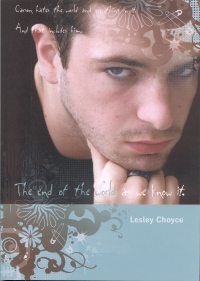| ________________
CM . . .
. Volume XIV Number 3 . . . .September 28, 2007 
 |
The End of the World as We Know It.
Lesley Choyce.
Calgary, AB: Red Deer Press, 2007.
223 pp., pbk., $12.95.
ISBN 978-0-88995-379-6.
Grades 8-11 / Ages 13-16.
Review by Joan Marshall.
** /4
|
| |
|

excerpt:
"How long have you lived here?" I asked.
"Forever. Forever and then some. You want to hear my story?"
"No. I hate it when people want to tell me their life stories."
Christine looked hurt. She stopped in her tracks. "You're about as sweet as they get, aren't you?"
"Politeness is not one of my endearing characteristics. Honesty is."
"As if."
"What does that mean?"
"No one is honest. Everyone is out for themselves and will say whatever they can think to say that will get them what they want."
"I don't want anything."
She laughed, which really freaked me out. Because it changed her entire face, her whole being. I mean, she really looked pretty instead of hard. But it vanished quickly like the sun cracking through the heavy clouds of a dark day – a quick tease and then a vanishing act that left you feeling worse than before. "Oh, you want something, Dreamboy. We all want something, even when we don't know what it is." Then she scrunched up her nose. I think she was sucking back snot. "You want a beer?"
It's hard to like Carson, a 17-year-old student at school-of-last-resort, Farnsworth Academy. In spite of material wealth, supportive parents and middle class security, he has always been a bad child, hurtful and cold towards others and entirely self-obsessed and self-righteous. In fact, he suffers from depression, either undiagnosed or untreated or both. This is the story of how in his final year at school, he befriends Christine, a girl who self-mutilates due to her parents' abandonment, and how his love and concern for her turns both of their lives around. Somewhat.
Carson's black, gloomy outlook, cynical in the extreme, dominates and depresses the first half of this book. For such a bright teen, determined to tick off everyone in authority, Carson seems a little naïve (Christine buys the condoms; he has no idea why her arms are scarred). Carson's unmitigated hatred of everything is echoed in Mel, the owner of the local bookstore where Carson feels accepted and safe. As Carson becomes more interested in Christine and her problems, he is also drawn to caring for the school grounds and watching out for his dysfunctional roommate, Fin. Both the head of the school, Dr. Cromwell, and the Vietnamese cook, Mrs. Chin, have survived horrifying pasts and come to unconditional support of problem students. But when the school has to shut down due to financial problems, and Carson and Christine head for a wilderness cabin to experience Waldon-like simplicity, everyone wonders where they are, and it is Christine who finally insists that he hike out to call his parents. As the year limps to a close, their relationship cools, Christine re-connects with her mother, and Carson ends up working on the grounds of Dr. Cromwell's new school.
It's unfortunate that Choyce doesn't address Carson's depression directly, choosing instead to imply that Carson's black moods can be changed by his falling in love with Christine. (Ugly depression like this is usually treated by a combination of medication and psychotherapy. Certainly it would not be ignored by parents or treated so lightly by school personnel.)
Ambiguously set in a coastal town which could be either American or Canadian, with a brooding photograph of an unshaven, moody young man on the cover, this novel will attract younger teens who are titillated by the word "ass" and full admiration for Carson' defiant attitude. Older, more jaded teens, with the weight of the world on their shoulders, will sigh with recognition as Caron and Finn rant on and on about the state of the world.
Fortunately, Choyce ends the book realistically, although for the intended audience, that may be a let-down. What? No gritty survival in the woods? Acceptance of your mother's moral weaknesses? Actually working? And liking it? No way. Yes, way. Real life. And for that we should all be thankful.
Recommended.
Joan Marshall, a Winnipeg, MB, bookseller, is a former teacher-librarian who has met more than a few Carsons.

To comment
on this title or this review, send mail to cm@umanitoba.ca.
Copyright © the Manitoba Library Association. Reproduction for personal
use is permitted only if this copyright notice is maintained. Any
other reproduction is prohibited without permission.
NEXT REVIEW |
TABLE OF CONTENTS FOR THIS ISSUE
- September 28, 2007.
AUTHORS |
TITLES |
MEDIA REVIEWS |
PROFILES |
BACK ISSUES |
SEARCH |
CMARCHIVE |
HOME |
